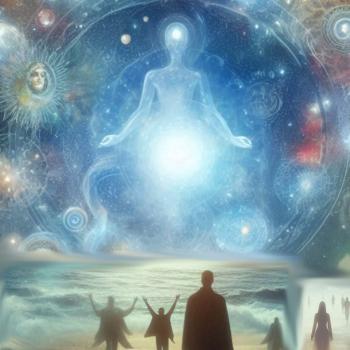We understand reasonably well when life ends. The body becomes no longer able to support itself, even with the help of machines. We can make aspects of the body go on for years with the use of machines and artificial feeding, but at some point there will likely come the decision to terminate, to pull the plug, knowing that the brain no longer functions. We respect the sanctity of life so much that we will keep coma patients “alive” for months to even years, and keep bodies alive for short times for organ donation.

Image by Brooke Hoyer on Flickr
We don’t seem to recognize when life begins
There are four aspects of this:
- What is life?
- What does the law consider life?
- How does the medical community define life and death?
- What is the metaphysical (religious) definition of life?
- Do we really believe in the sanctity of life?
What is life?
The definition of life is, “The condition that distinguishes animals and plants from inorganic matter, including the capacity for growth, reproduction, functional activity, and continual change preceding death.”
This is probably a stricter definition than many would like to apply to any individual. Certainly some who are diseased or dysfunctional may not have all their capacities, but are still regarded as alive. But we generally recognize the living being as being able to support themselves. Yet not all living beings are able to support themselves.
In this definition are major problems:
Should the living be able to support themselves? This definition would apply equally to a fetus as to those who are children, and those who are adults.
“Functional Activity” is defined in a medical sense as: “1. A task or act that allows one to meet the demands of the environment and daily life. 2. An activity that is essential to support the physical, social, and psychological well-being of a person and allows that person to function in society.” This includes both bodily processes and such things as grooming.
How we define life is rife with exceptions. A quadraplegic who has no control of extremities below the neck, and from disease may lose control of even basic abilities in the head, is considered alive. Steven Hawking comes to mind as a person who made enormous contributions to science even when he was in this state.
We don’t have a thorough definition of what life is.
What does the law consider life?
The US Supreme Court, in overturning Roe V Wade, did the country a favor in allowing us to examine what life is, when it begins, when it can be terminated, and to bring this into law through legislation rather than court action.
US Constitution on life
The US Constitution codifies a very high regard for life. The right to life is enshrined in the US Constitution as a highest right that can only be taken away under very strict circumstances. Amendment 14: “No state shall make or enforce any law which shall abridge the privileges or immunities of citizens of the United States; nor shall any state deprive any person of life, liberty, or property, without due process of law; nor deny to any person within its jurisdiction the equal protection of the laws.”
How are laws made?
Generally US laws are made when 38 of 50 states have created laws on something.
An example of this process is the Equal Rights Amendment for women, which after some time was ratified by 38 states. It has been a contentious issue and some still take it to court who don’t want equal rights for women.
“Congress passed the ERA in 1973 and initially gave states until 1979 to ratify it by a three-fourths majority. The deadline was extended to 1982, but the ERA fell three states short of the 38-state threshold. More recently, a groundswell of support for women’s rights led Nevada to ratify the ERA in 2017, followed by Illinois in 2018. In January 2020, Virginia became the historic and crucial 38th state to ratify the ERA.” The Equal Rights Amendment: What You Need To Know.
Some would prefer that 38 States come to some agreement on things like abortion. Then larger question is, does abortion go against the right to life explicit in the US Constitution. This question likely makes it a federal law question, not a state’s question.
How does the medical community define life and death?
“A person was considered dead when the entire brain — including the brainstem, its most primitive portion — was no longer functioning, even if other vital functions could be maintained indefinitely through artificial life support.”
At the end of the 10th week of pregnancy, your baby is no longer an embryo, it’s now a fetus or an unborn baby. At 22 weeks it can survive outside of the womb with help as a premature baby.
The brain doesn’t form into a functional unit, that is the senses of hearing, smell, and touch are developed and functional, until 28 weeks, that’s 7 months into pregnancy.
This definition of death casts abortion in a different light. How can you kill something that isn’t considered alive? How can you try to make something live that is functionally unable to support life?
The lack of a clear definition of what life is, as noted under headings above, makes this a very murky subject. We make exceptions to our definitions that err on the side of being humane and preserving life. This makes things very murky and not subject to a rigid standard or set of rules. No wonder doctors are confused about what laws mean in areas that have banned abortion.
What is the metaphysical (religious) definition of life?
Life in the Bible is strongly connected with “breath.” In this the Bible has a “functional description” of life: “Then the Lord God formed man of dust from the ground, and breathed into his nostrils the breath of life; and man became a living being.” – Genesis 2:7 (NASB) There are many passages associating breath with life. Breath.
The Psalmist and the Prophet Jeremiah reflected on God forming them:
“Before I formed you in the womb I knew you, And before you were born I consecrated you; I have appointed you a prophet to the nations.” – Jeremiah 1:5 (NASB)
The psalmist reflects more in depth on this process of being made: “For You formed my inward parts; You wove me in my mother’s womb. I will give thanks to You, for I am fearfully and wonderfully made; Wonderful are Your works, And my soul knows it very well. My frame was not hidden from You, When I was made in secret, And skillfully wrought in the depths of the earth; Your eyes have seen my unformed substance; ….” – Psalm 139:13-16 (NASB)
The psalmist associates the secret place (womb) with the depths of the earth.
We all come from dirt.
We all survive on what comes from dirt.
When we die we all become dirt.
Never treat others like dirt.
Life thrives on sunshine.
Be sunshine while you’re here.
It matters most what we do here to each other.
Otherwise we’re just dirt.
Dorian Cole (first published by the author (me) on Facebook.)
For dust you are and to dust you will return. – Genesis 3:19
All Scripture is God-breathed and is useful for teaching
“… It is written, ‘Man shall not live on bread alone, but on every word that proceeds out of the mouth of God.’”
Dirt, womb, breath, Word, water – these are the things that the Bible associates with life. This is both a functional description in that these are the things that bring life and sustain life, and a metaphysical description. Implicit in this functional description is that God breathes into the form that is capable of sustaining life, and that person is dependent on God for what is considered life – that is godliness.
The metaphysical or Biblical description of life is that we are nothing until God breathes into us, and we find our continued life in God.
The exception to this is found in Exodus. ““If men struggle with each other and strike a woman with child so that she gives birth prematurely, yet there is no injury, he shall surely be fined as the woman’s husband may demand of him, and he shall pay as the judges decide. But if there is any further injury, then you shall appoint as a penalty life for life ….” – Exodus 21: 22-23 (NASB)
Exodus has a lot of penalties in it that we disregard because they are inhumane, brutal, and lack forgiveness and love, such as requiring an eye for a eye. In this passage causing a premature birth is equated with a monetary fine. But injuring the woman is grounds for a permanent physical injury to the offender. In other Hebrew Bible passages, God doesn’t hold life of people or the unborn in such high esteem. Abortion was practiced in those times, but the Bible has word for it. The Bible, both Hebrew and Christian, is actually silent on the issue. What Does the Bible Really Say About Abortion?
We shouldn’t read too much into this ancient way of life. But the sanctity of the fetus is not placed in such high regard as many today place it.
Do we really believe in the sanctity of life?
Many ask a very solemn question: “If we are very willing to protect a fetus or unborn baby, why are we less willing to protect those who are alive?”
While the debate will rage about how we can avoid responsible for our neighbor, the reality is that the capitalist system we love leaves people out. It’s up to us to step in and make things right either in a macro or micro way.
From my previous column, Hypocritical religion in the face of need is wrong
““Is this not the fast which I choose: To loosen the bonds of wickedness, To undo the bands of the yoke, And to let the oppressed go free And break every yoke? “Is it not to divide your bread with the hungry And bring the homeless poor into the house; When you see the naked, to cover him; And not to hide yourself from your own flesh?”
Takeaway
Does this mean we should or should not believe in the sanctity of life in the womb? Or that we should discriminate between a developing fetus and an unborn baby? Is brain function a primary determinant of both life and death?
Embryo for 10 weeks, at 22 weeks it can survive outside of the womb with help as a premature baby, 28 weeks brain functions begin.
Yet many people argue over whether they should help their living neighbor. Many seem to have more compassion for an embryo than for people. What does this say about us?
Maybe there should be no law about abortion, just like in Biblical times. Maybe we shouldn’t try to codify this into law that would be endlessly complicated. Maybe we should practice love and leave decisions like this up to parents and doctors who have to make difficult decisions and live with the consequences.
Let us do justice with love as the guiding principle.
Series Links
God has no needs that we can fulfill
The Prophets: God wants us to take care of others
________________________
The standard of belief and conduct for Christianity is love. Legal standard.
________________________
If you find these articles intriguing, please consider joining the mailing list.
If I’ve challenged your thinking, I’ve done my job.
___________________
Our answer is God. God’s answer is us. Together we make the world better.
– Dorian












